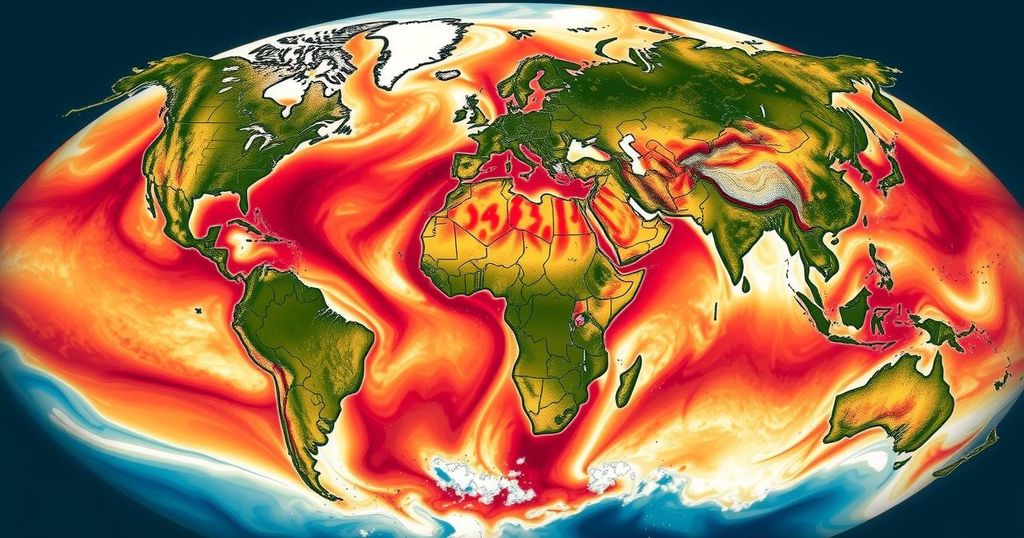A UN-backed report reveals that over 75% of the world’s land has become permanently drier in the last 30 years, affecting up to five billion people by 2100. Dry land now covers about 40% of Earth’s terrestrial area, posing significant risks, including food insecurity and forced migration. Urgent international collaboration and innovative solutions are needed to address this growing crisis.
A recent report by the United Nations Convention to Combat Desertification (UNCCD) reveals that over 75 percent of the world’s land has become “permanently drier” in the past three decades. This alarming trend, which has intensified during ongoing climate talks in Saudi Arabia, threatens to impact up to five billion individuals by the year 2100. The report notes that dry land currently encompasses approximately 40 percent of the planet’s terrestrial area, excluding Antarctica, highlighting a significant increase in aridity.
The report indicates that drier conditions have affected about 77.6 percent of Earth’s land from 1990 to 2020, representing an increase of 4.3 million square kilometers—an area approximately one-third the size of India. Observations reveal that aridity, characterized by a chronic lack of water, presently covers 40.6 percent of Earth’s land, a notable rise from 37.5 percent three decades prior. The findings underscore an enduring transformation rather than temporary droughts, with regions such as southern Africa, the Mediterranean, southern Australia, and various parts of Asia and Latin America being most significantly impacted.
“For the first time, the aridity crisis has been documented with scientific clarity, revealing an existential threat,” said Ibrahim Thiaw, Executive Secretary of the UNCCD. He cautioned that the transformed climate will not revert to its previous state, fundamentally altering life on Earth. This shift appears to stem from climate change driven by greenhouse gas emissions that modify rainfall patterns and elevate evaporation rates.
The report emphasizes the urgent need for countries to anticipate the ramifications of desertification and adapt accordingly. Effective strategies may include evolving agricultural practices and utilizing drought-resistant plant varieties. However, the report warns that solutions currently effective may not remain viable in a progressively arid world.
The lead UNCCD Chief Scientist, Barron Orr, stated, “For the first time, a UN scientific body is warning that burning fossil fuels is causing permanent drying across much of the world,” marking a crucial turning point in acknowledging the impacts of human activities on global warming.
Consequentially, the ramifications of extended water shortages extend to soil degradation, food insecurity, and forced migration, as illustrated by the report’s findings that 2.3 billion individuals currently inhabit arid regions, with projections indicating that this number may escalate to five billion due to climate progression. The report urges integration of aridity metrics into drought monitoring systems and improved soil and water management practices to bolster resilience among vulnerable communities.
The UNCCD report comes at a critical time during global discussions on climate change and desertification, specifically the 16th Conference of the Parties (Cop16) held in Riyadh, Saudi Arabia. Desertification is a significant issue that affects land productivity, water availability, and overall ecosystem health. With over 75 percent of land exhibiting signs of permanent drying, the need for comprehensive strategies to combat this issue has become increasingly urgent, particularly as it poses a direct threat to the livelihoods of billions of people worldwide. The increase in aridity correlates with more frequent episodes of drought, which have profound socio-economic implications, including increased migration, food insecurity, and ecological damage.
In conclusion, the UNCCD report serves as a stark reminder of the escalating crisis of desertification and its far-reaching implications for human life and the environment. Acknowledging the trend of increasing aridity and its potential to affect billions underscores the necessity for immediate and effective action. By integrating robust monitoring systems and promoting sustainability in agriculture, there is hope to mitigate the potentially catastrophic impacts identified in the report. The urgency of this situation cannot be overstated, as the future of many communities depends on our responses to these profound climatic changes.
Original Source: www.rfi.fr







